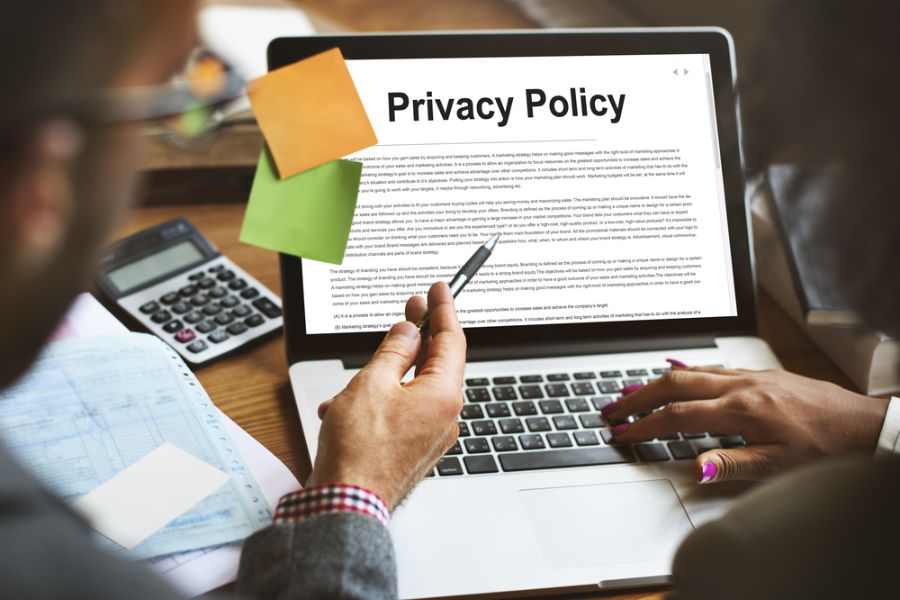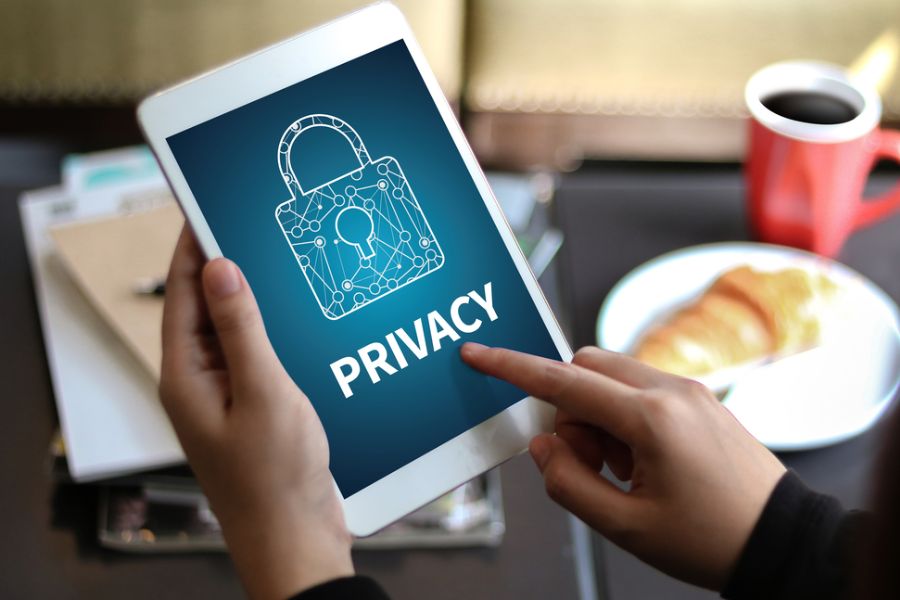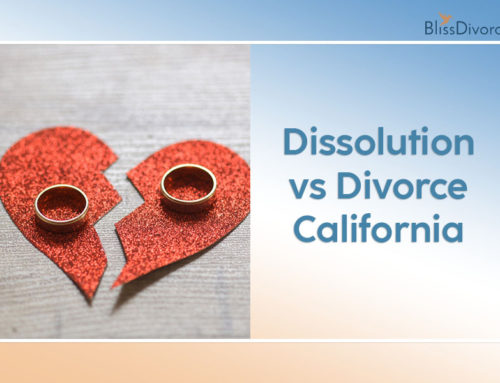Going through a divorce process is nerve-wracking, stressful, and overwhelming. Besides the emotional heartache, there are many legal concerns on your shoulders.
Even if you and your spouse are going through it in a civil manner, there’s still lots of distrust. That’s why this article will focus on online divorce and your privacy.
To avoid snooping eyes, knowing how to protect your personal information is important. This is especially important when it comes to online platforms and privacy.
Continue reading to discover the most important precautions and guidelines for staying protected during online divorce!

Source: shutterstock.com / Photo Contributor: Studio Romantic
Why Is Your Privacy Important During Online Divorce?
Before learning how to stay protected during online divorce, you must understand its importance. Even though you and your partner are going through the process peacefully, you should always be careful. Divorce in California can be tricky, even when done online.
With an ongoing process, here are the main benefits of keeping your information safe:
- Reduces conflict – A common issue during online divorce is conflict with your spouse . Keeping yourself protected online helps minimize this risk.
- Prevents your ex-spouse from taking advantage of your information – The most concerning issue is getting your personal information misused during the trial. It’s surprising how many people use this trick to get more assets. Furthermore, any misinformation might directly affect custody, asset division, and alimony. So, protecting your online information ensures the best outcome from the process.
- Reduces emotional distress – Knowing that your personal life and information are protected gives you a feeling of safety. Since the divorce is already stressful enough, any anti-anxiety measures are beneficial. You may rest easy knowing that your personal life choices won’t affect your case.
How to Stay Protected During Online Divorce
After understanding the importance of online divorce and your privacy, there are several safety measures to remember:
- Changing your password
- Applying two-factor authentication
- Disabling GPS permissions
- Checking for spyware and deleting unfamiliar apps
- Protecting social media accounts
- Disabling cloud services and shared devices
- Purchasing a new phone and data plan under your own name
- Choosing suitable data storage
- Disabling camera access.
If you feel unsafe doing this alone, more information is provided below. Remember, even if you’re doing your divorce in person through divorce lawyers in San Francisco or other California cities, you’ll still want to follow these practices carefully to ensure privacy and safety.

Source: shutterstock.com / Photo Contributor: Rawpixel.com
Changing your passwords
The first thing you should do is change your passwords. This way, you restrict access to personal information. Remember to do so on all your online platforms, including:
- Social media accounts
- Emails
- Online banking or payment platforms
- Phone and apps.
Don’t create passwords based on your personal life to ensure your safety. You may try using an online password generator instead. This way, your spouse won’t be able to easily guess and crack them.
Furthermore, you should keep the newly-generated password in a secure location. Avoid relying on the “Remember me” and autocomplete functions. Remove them from all your devices and browsers so only you can enter the selected password.
Applying two-factor authentication
The next step is to use two-factor authentication wherever possible. Doing so adds an extra layer of protection when accessing personal accounts.
Additionally, you’ll need to verify your identity before logging into your account. This way, you may easily avoid account breaches and stop someone (including your spouse) from snooping around.
Disabling GPS permissions
When it comes to online divorce and your privacy, disabling GPS permissions is a must. It’s quite frequent for a spouse to track your location during a separation. Whether it’s for personal or court-related issues, this practice is always unsettling.
To prevent this from happening, go over the apps you have installed on your phone. If you have a built-in ‘Find my phone’ app, ensure it’s disabled. Furthermore, make sure you aren’t sharing your location with anyone.
You should do the same for all your devices, accounts, and programs. Additionally, avoid tagging a location on social media posts. This way, you won’t be giving away any personal information yourself.
Lastly, if you’ve done all the above and still feel as if your spouse is tracking you, check for any tracking devices and spyware on your phone.
Checking for spyware and deleting unfamiliar apps
One of the biggest security risks is having spyware on your phone or computer. You may have this program installed on your device for a monthly charge. Depending on the type of spyware, a person may track different actions. However, someone may use such apps to monitor text messages, emails, and internet searches.
If you suspect that someone is spying on you, always check for unfamiliar apps. Double-check anything that sounds suspicious or that you don’t remember downloading yourself.
Furthermore, be aware that installing spyware on someone’s personal device is illegal. If you have proof that you’re a victim of such tricks, inform the local authorities. You may also use this as leverage during your divorce trial, if it comes to that.

Source: shutterstock.com / Photo Contributor: one photo
Protecting social media accounts
The next step you should take is securing your social media accounts. Even though this sounds simple, there are several crucial steps during the process.
Adjusting privacy settings
First, check out all your social media account’s privacy settings. Make sure your posts are private and only available to your friends if there’s an option. Depending on your platforms, here are some quick security tips for the most popular ones:
- Twitter – To protect your tweets, you should access the privacy settings by tapping on your profile picture. Once you’ve entered the “Audience and tagging” section, turn the “Protect your tweets” slider on.
- Facebook – Once again, enter the privacy settings in the top right corner. In the “Audience and visibility” section, you can choose the privacy option you want. There are several great features available. Some of them are: disabling geolocation, restricting specific people from viewing your posts, and even disabling the tagging option.
- Instagram – To make your account private, tap the profile picture and go to settings. Next, enter the “Who can see your content” section. Under “Account privacy,” you can set your account to private mode. This way, only your followers can see your posts, likes, and comments.
Regulating the friend list
Secondly, you should always be aware of who you accept as a friend or follower. If you and your spouse aren’t on good terms, they may try to access your information from fake accounts. So, go over your friend list and try to remove any shady or fake-looking profiles.
Furthermore, you can restrict access to your spouse’s friends or family. This way, they can’t share your information with them. When accepting friends or following requests, double-check if you know the person. Always ensure they’re safe to view your profile and won’t try to share your information behind your back.
Regulating what you post and not deleting the content
After making all the necessary privacy changes, you should also watch out for what you’re posting.Don’t ever share details or post about the ongoing divorce process online. Moreover, you should avoid sharing addresses, phone numbers, and license plates.
If you’ve already posted a piece of content that someone may use against you, don’t delete it. They may be misinterpreted during a trial as an indication of guilt.
Informing your friends
Even if you’ve maximized your security potential, remember that others can post on their social media about you. So, you should tell your friends about your ongoing divorce process. Confide in them about the risks to your privacy. This way, you’ll prevent them from sharing any unsuitable content about you.

Source: shutterstock.com / Photo Contributor: PanuShot
Disabling Cloud services and shared devices
During an online divorce, you should always disable any shared devices and cloud services. Ensure that no photos or documents are being automatically uploaded to a platform. This may be a huge disadvantage since your spouse can easily access them. Be especially wary of Dropbox, iCloud, Amazon, and Google.
If you have kids, you may use this feature to manage their online activity and devices. Yet, it’s important to disable them as well, at least during the separation. After the process is over, you can simply turn it back on.
Purchasing a new phone and data plan
Another safety precaution is changing your mobile phone and data plan. This not only protects you but may help take the stress off you. You can be confident your spouse won’t be able to track your messages or calls if you have your own mobile and data plan.
Choosing suitable data storage
You should always secure your private information in suitable data storage. This includes personal data, important paperwork, and photos. Consider investing in an external hard drive and uploading your data there. You can also use USBs, a NAS device, disks, and manually regulated Cloud services.
Disabling camera access
The last security step you should take is disabling camera access. Remember to do so both on hardware and software. Restrict the camera access to any apps that require it and secure the CCTV or doorbell cameras. If something can track your surroundings, it’s easy for your spouse to misuse it.

Source: shutterstock.com / Photo Contributor: SOMKID THONGDEE
Conclusion
You should consider several important steps when dealing with online divorce and your privacy. Even though they may seem over the top, they’ll keep your data private and secure.
Remember that divorce can get messy, and any valuable information plays an important role. So, if you’re going through a separation, follow this guide and make the necessary changes!




